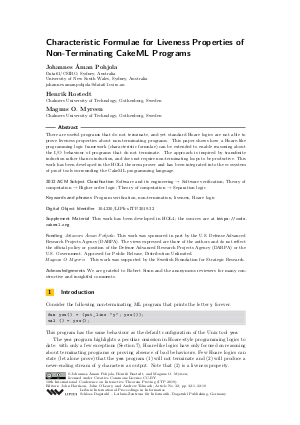@InProceedings{amanpohjola_et_al:LIPIcs.ITP.2019.32,
author = {\r{A}man Pohjola, Johannes and Rostedt, Henrik and Myreen, Magnus O.},
title = {{Characteristic Formulae for Liveness Properties of Non-Terminating CakeML Programs}},
booktitle = {10th International Conference on Interactive Theorem Proving (ITP 2019)},
pages = {32:1--32:19},
series = {Leibniz International Proceedings in Informatics (LIPIcs)},
ISBN = {978-3-95977-122-1},
ISSN = {1868-8969},
year = {2019},
volume = {141},
editor = {Harrison, John and O'Leary, John and Tolmach, Andrew},
publisher = {Schloss Dagstuhl -- Leibniz-Zentrum f{\"u}r Informatik},
address = {Dagstuhl, Germany},
URL = {https://drops.dagstuhl.de/entities/document/10.4230/LIPIcs.ITP.2019.32},
URN = {urn:nbn:de:0030-drops-110872},
doi = {10.4230/LIPIcs.ITP.2019.32},
annote = {Keywords: Program verification, non-termination, liveness, Hoare logic}
}

 Creative Commons Attribution 3.0 Unported license
Creative Commons Attribution 3.0 Unported license



